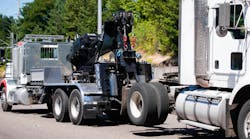General Motors has teamed with Coskata to support its new breakthrough technology that supposedly can make ethanol from practically any renewable source – including garbage, old tires and plant waste – both cheaply and efficiently.
“We are very excited about what this breakthrough will mean to the viability of biofuels and, more importantly, to our ability to reduce dependence on petroleum,” said Rick Wagoner, GM chairman & CEO, during a press event at the North American International Auto Show.
He noted Coskata’s proprietary process uses patented microorganisms and bioreactor designs to produce ethanol for less than $1 a gallon, which is about half today’s cost for producing gasoline. It’s also energy-efficient, according to research by the Argonne National Laboratory, as for every unit of energy used in Coskata’s process, it generates up to 7.7 times that amount of energy in ethanol fuel. This process uses less than a gallon of water to make a gallon of ethanol, compared to three gallons or more for other processes.
GM said it would receive the first batch of ethanol fuel from Coskata’s pilot plant in the fourth quarter of 2008 before testing it in vehicles at its Milford Proving Grounds in Michigan. Wagoner added that GM has high hopes for this ethanol-making process, as it could lead to joint efforts in markets such as China, where growing energy demand and a new energy research center could jump-start a significant effort into ethanol made from biomass.
However, according to GM, the autogiant still believes no single technology will address vehicle energy and environmental issues in every part of the world, so the company plans to continue investing in a broad range of technologies. These include ethanol and hybrids, such as two-mode hybrid passenger vehicles that boost fuel economy by 50% in city driving and 25% overall, as well as hydrogen-powered fuel cell vehicles and extended-range electric cars.


